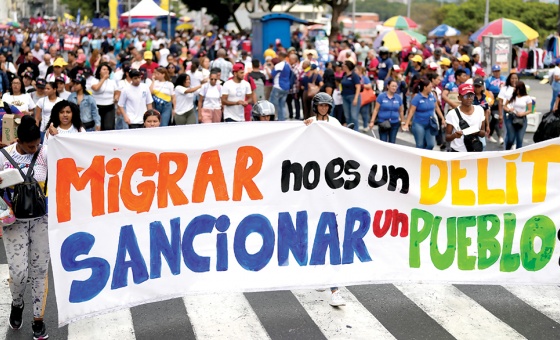This is the last article you can read this month
You can read more article this month
You can read more articles this month
Sorry your limit is up for this month
Reset on:
Please help support the Morning Star by subscribing here
INVASION of the Spirit People (And Other Stories, £11.99) is Juan Pablo Villalobos sixth novel and one of his most compelling.
The story set in unnamed city where migrants battle against a worrying rise of neofascism, right-wing nationalism and societal paranoias about foreigners.
The main character, a middle-aged man “from the Southern Cone” called Gaston who is best friends with Max, an immigrant who runs a shabby restaurant in the city, and Pol, Max’s son, a young biologist sent to the tundra to research micro-organisms capable of surviving in extreme conditions.
This is a fascinating examination of otherness, the daily lives of migrants in Europe, the rising xenophobia, as well as the power of friendship and love as an antidote to despair.
There are hilarious nods to sci-fi and moving references to migrant literature.
Villalobos’s dealing with the notions of borders, nationalities and belonging, appealed to me in particular.
He describes migrants as North Easterners, Near Easterners, Far Easterners, or people, like Gaston, “who live far away, although they live to the north of the Southern Cone, in the Northern Cone, at the far limits of the West.”
As one of the characters explains towards the end of the book: “The really dangerous thing is the idea that everything that comes from outside, anything alien, is a threat that must be eradicated… This fantasy that we have to protect some… original, primitive order, to safeguard some sort of essence, traditions, a better past.”
An oustanding novel, exquisitely translated by Rosalind Harvey, by one of my favourite Mexican novelists writing today.
Katya Adaui’s Here Be Icebergs (Charco Press, £9.99), also translated by Rosalind Harvey, is a collection of 12 short stories that deal with dysfunctional families and complex family relationships.
The stories, some set in an unmentioned Lima, Peru, examine the different perspectives of family members.
From two sisters’ contrasting experiences of childhood to the shocking revelation of a boy abused by his cousin in the family home.
Adaui examines how language and its fragmentary qualities deal with trauma.
My favourite, Seven Waves, has a mother and daughter meeting for lunch to discuss the dead father/husband’s life insurance but the conversation quickly sours.
“Let’s not wait another seven months before seeing each other, you’re all I’ve got left. She smiles at me. I take refuge in her smile and for a moment I think: she’s not asking for anything in return, she hasn’t taken anything from me.’
Adaui’s jagged language, acerbic and clinical, helps to grasp the intricacies of complex family relations.
Flint (Contraband Books, £10) by Mexican writer and poet Adriana Diaz Enciso, is a lyrical meditation on death, life’s renewal and how external events can impact our lives in fortuitous ways.
Part elegy in prose, part dream diary, it’s been written after the sudden death of Keith Flint, member of the The Prodigy.
“I never read the papers in the tube. But I did, that night. Someone had left the Metro on the seat next to me, open where news of your death was exposed. That’s how it happened.”
The celebrity-worship obsession is explored in detail by the author, who even attended Flint’s funeral.
The death coincided with that of the author’s dear friend in Mexico, and turned this pamphlet into a requiem: “Even as the petals fall in the breeze like dreamy curtains, confetti, the gentlest touch, there are blooming, and more — the pulse is unquenchable.”
Veronica Zondek’s Cold Fire (World Poetry Books, £14) is a stunning poetry collection that has the northern wind at its core — the one that crosses the Chilean deserts and Andes with urgency and energy.
There are pumas, condors, the south Andean deer or huemul, and pine trees in these refined poems: “The earth a fragment / the wind a fragment / the birds / the labour / the mountains / the seas./ The bones a fragment / the horse skulls / the hides / the lust of power.”
Beautifully translated by Katherine Silver, the collection moves from single lines poems to whole sections where repetition, musicality and rhythm play a key part.
A notable accomplishment by one of Chile’s most prolific poets.
Julia Wong Kcomt’s Vice-royal-ties (Ugly Duckling Presse, £8) was originally published in Buenos Aires in 2009 as Bi-rey-nato, a title that references the Viceroyalty of Peru and the former Viceroyalty of the Rio de la Plata.
Translator Jennifer Shyue has retained superbly the Spanish nuances in English to keep alive this fascinating lyrical voice from Peru.
Wong KComt, born into a Tusan (Chinese-Peruvian) family in the north-eastern coastal Chepen, explores borders, ethnic diversity and religion: “Papa [daddy] told me to detest the Japanese / like everyone says to hate Chileans./ … In the Atacama Christ sifts / through red grape seeds./ Peru dies, Wata, and all I remember is what you said about my aunt:/ ‘She was hot, your aunt Carmen,/ she didn’t look Chinese.’/ I smiled unoffended, because in Peru nobody / looks like anything.”









